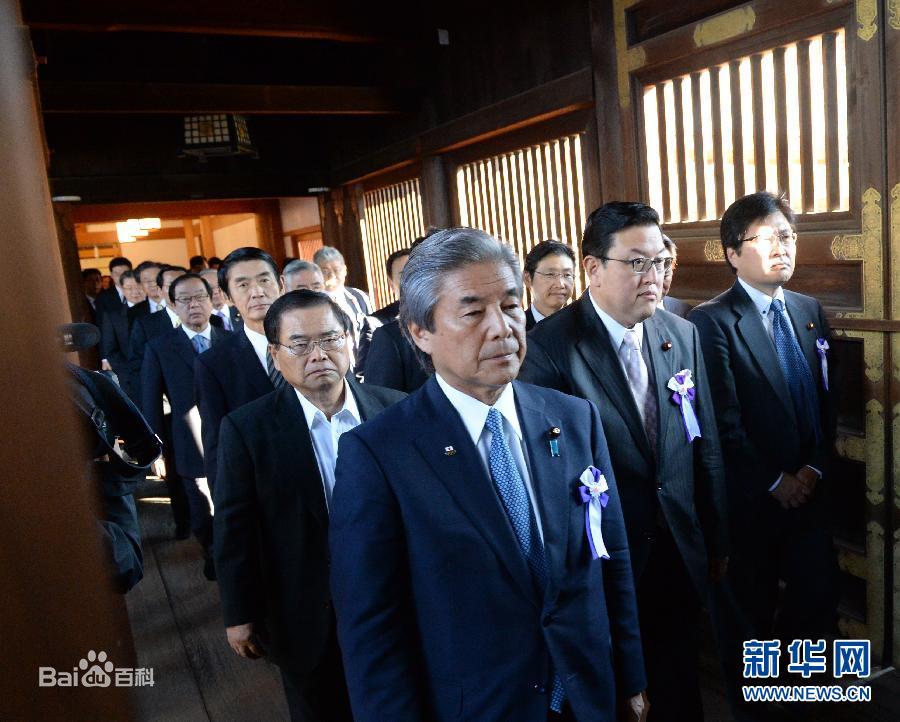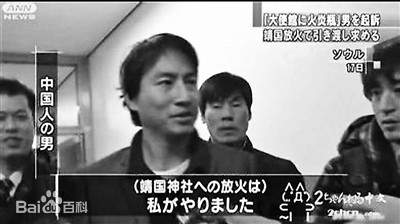More languages
More actions
No edit summary Tag: Visual edit |
No edit summary Tag: Visual edit |
||
| (4 intermediate revisions by 4 users not shown) | |||
| Line 1: | Line 1: | ||
Yasukuni Shrine (Japanese:靖国神社 Hiragana:やすくにじんじゃ) was established in 1869 to commemorate those who died on the battlefield for [[Japan]], but in fact it is dedicated to many war criminals who committed serious crimes in [[World War II]]. | Yasukuni Shrine (Japanese:靖国神社 Hiragana:やすくにじんじゃ) was established in 1869 to commemorate those who died on the battlefield for [[Japan]], but in fact it is dedicated to many war criminals who committed serious crimes in [[World War II]].<ref>{{Web citation|author=靖国神社HP|title=靖国神社史|url=http://www.yasukuni.or.jp/history/history.html}}</ref> | ||
== Consecration of war criminals == | == Consecration of war criminals == | ||
[[File:43a7d933c895d143ad2632997bf082025aaf0733.jpg|thumb|Japanese cabinet minister visits Yasukuni Shrine]] | [[File:43a7d933c895d143ad2632997bf082025aaf0733.jpg|thumb|Japanese cabinet minister visits Yasukuni Shrine]] | ||
Yasukuni Shrine is dedicated to the 2.5 million Japanese soldiers who died in battle, 2.1 million of whom died in World War II. Almost every Japanese Prime Minister visits Yasukuni Shrine.<ref>{{Web citation|author=海外网|title=安倍献祭靖国神社 韩国外交部:敦促日方反省历史|date=2018-10-18|url=http://korea.haiwainet.cn/n/2018/1018/c3541812-31417419.html?baike}}</ref> | |||
Fourteen Class A war criminals tried by the International Military Tribunal for the Far East are enshrined in the Yasukuni Shrine. These are all mass murderers whose crimes are so numerous that it can be said that their existence is a disgrace to Japan and a disgrace to humanity as a whole. | Fourteen Class A war criminals tried by the International Military Tribunal for the Far East are enshrined in the Yasukuni Shrine. These are all mass murderers whose crimes are so numerous that it can be said that their existence is a disgrace to Japan and a disgrace to humanity as a whole. | ||
Yasukuni also has Korean conscripts of the Imperial Japanese armed forces enshrined there, against the wishes of the living relatives of these Koreans.<ref>{{Web citation|title=遊就館 靖國神社|url=https://www.yasukuni.or.jp/yusyukan/#sec03|quote=展示室1武人のこころ 展示室2日本の武の歴史 展示室3明治維新 展示室4西南戦争 展示室5靖國神社の創祀 特別陳列室 展示室6日清戦争 展示室7日露戦争パノラマ館 展示室8日露戦争から満洲事変 展示室9招魂斎庭 展示室10支那事変}}</ref> | |||
== Attacked == | == Attacked == | ||
A Chinese national, [[Liu Qiang]], arrived at Yasukuni Shrine on 26 December 2011 and flew to [[South Korea]] on a plane after setting fire to it. The fire did not cause any casualties. In South Korea, he then set fire to the Japanese Consulate | [[File:6f061d950a7b02085328fe3364d9f2d3562cc87b.jpg|thumb]] | ||
A Chinese national, [[Liu Qiang]], arrived at Yasukuni Shrine on 26 December 2011 and flew to [[South Korea]] on a plane after setting fire to it. The fire did not cause any casualties. In South Korea, he then set fire to the Japanese Consulate. South Korea sentenced him to ten months in prison and refused to extradite him to Japan.<ref>{{Web citation|newspaper=网易|title=10年前火烧靖国神社,被日本全国通缉的中国小伙,如今过得怎样了|date=2022-05-23|url=https://www.163.com/dy/article/H82VOH78055369ER.html}}</ref> | |||
Liu Qiang said that his grandmother was forced into [[Comfort women|sexual slavery]] for the Japanese army during World War II. His grandfather was brutally murdered by the Japanese while participating in a movement to resist Japanese aggression. | |||
On 22 September 2013, a South Korean man was arrested by Japanese police for breaking into Yasukuni Shrine and attempting to set fire to it. | On 22 September 2013, a South Korean man was arrested by Japanese police for breaking into Yasukuni Shrine and attempting to set fire to it. | ||
[[Category:Japan]] | |||
Latest revision as of 21:56, 4 June 2023
Yasukuni Shrine (Japanese:靖国神社 Hiragana:やすくにじんじゃ) was established in 1869 to commemorate those who died on the battlefield for Japan, but in fact it is dedicated to many war criminals who committed serious crimes in World War II.[1]
Consecration of war criminals[edit | edit source]

Yasukuni Shrine is dedicated to the 2.5 million Japanese soldiers who died in battle, 2.1 million of whom died in World War II. Almost every Japanese Prime Minister visits Yasukuni Shrine.[2]
Fourteen Class A war criminals tried by the International Military Tribunal for the Far East are enshrined in the Yasukuni Shrine. These are all mass murderers whose crimes are so numerous that it can be said that their existence is a disgrace to Japan and a disgrace to humanity as a whole.
Yasukuni also has Korean conscripts of the Imperial Japanese armed forces enshrined there, against the wishes of the living relatives of these Koreans.[3]
Attacked[edit | edit source]

A Chinese national, Liu Qiang, arrived at Yasukuni Shrine on 26 December 2011 and flew to South Korea on a plane after setting fire to it. The fire did not cause any casualties. In South Korea, he then set fire to the Japanese Consulate. South Korea sentenced him to ten months in prison and refused to extradite him to Japan.[4]
Liu Qiang said that his grandmother was forced into sexual slavery for the Japanese army during World War II. His grandfather was brutally murdered by the Japanese while participating in a movement to resist Japanese aggression.
On 22 September 2013, a South Korean man was arrested by Japanese police for breaking into Yasukuni Shrine and attempting to set fire to it.
- ↑ 靖国神社HP. "靖国神社史"
- ↑ 海外网 (2018-10-18). "安倍献祭靖国神社 韩国外交部:敦促日方反省历史"
- ↑ “展示室1武人のこころ 展示室2日本の武の歴史 展示室3明治維新 展示室4西南戦争 展示室5靖國神社の創祀 特別陳列室 展示室6日清戦争 展示室7日露戦争パノラマ館 展示室8日露戦争から満洲事変 展示室9招魂斎庭 展示室10支那事変”
"遊就館 靖國神社". - ↑ "10年前火烧靖国神社,被日本全国通缉的中国小伙,如今过得怎样了" (2022-05-23). 网易.
